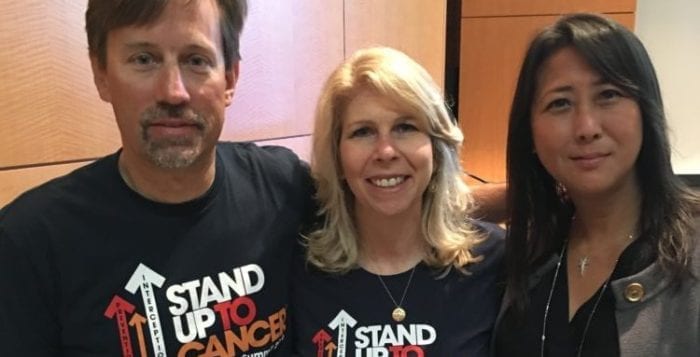Tuveson assumes larger role in pancreatic cancer battle at CSHL

By Daniel Dunaief
Even as David Tuveson was recently fishing for tautog for dinner, he conducted conference calls on a cellphone while watching the clock before an afternoon meeting. A professor at Cold Spring Harbor Laboratory and a world-renowned expert in pancreatic cancer, Tuveson describes the research of some of the students in his laboratory as having considerable bait in the water.
The director of research for the Lustgarten Foundation, Tuveson recently assumed greater responsibility for a larger boat, when he was named director of the Cancer Center at Cold Spring Harbor Laboratory, taking over a role the lab’s president Bruce Stillman held for 25 years. The Cancer Center, which is one part of CSHL, will be in “great hands since Dave Tuveson has wide respect int he cancer community because of his research accomplishments and his talents in leading others,” Stillman explained in an email.
Stillman, who will continue to run his own lab and serve as the President and CEO of CSHL, described Tuveson as a “thought leader” and a “great scientist.” Tuveson and his team of 20 in his laboratory are approaching pancreatic cancer in several directions. They are searching for biomarkers for early detection, developing and testing drugs that preferentially target cancer cells and seeking to uncover the molecular pathways that turn a mutated gene, inflammation, or an illness into a tumor.
Tuveson, who has MD and PhD degrees, focuses on finding ways to use science to help patients. He will continue the Cancer Center’s mission to understand the fundamental causes of the disease, while adding some new strategies. He plans to develop nutrition and metabolism as new areas for the Cancer Center and will recruit “ a few outstanding faculty,” he explained in an email.
CSHL will also expand its skills in immunology and chemistry. Tuveson has dedicated himself and his laboratory to taking innovative approaches to a disease that had received only one-half of 1 percent of the National Cancer Institute’s annual research budget in 1999. That is up to 2 percent today, according to the Lustgarten Foundation, which is the largest private funder of pancreatic cancer research.
Tuveson and his team have become leaders in the developing field of organoids. By taking cells from a tumor or cyst, scientists can produce a smaller copy of the tumor from inside a partial, reproduced patient pancreas. The painstaking work enables researchers to look for the specific type of tumor in a patient, while it also provides a model for testing drugs that might treat the cancer. The technique of growing organoids has become so refined that researchers can create a structure that’s a mix of normal, healthy cells blended with the tumor.
Scientists can then take the resulting structure, called a chimera, and test the effectiveness of therapies in destroying cancers, while monitoring the side effects on healthy cells. Stillman believes Tuveson’s work with pancreas cancer organoids “is at the cutting edge of research in this area.” Tuveson’s lab is using organoids to study what Tuveson, for whom metaphors roll off the tongue as often as characters break into song in Disney movies, describes as kelp-like projections. Each cell has parts that project out from the membrane. His staff is looking for changes in the kelp.
Tuveson is encouraged by work that might help find a subtle protein shift, or changes in the structure of the kelp, as a telltale sign about the type of tumor a patient who is otherwise asymptomatic might have. Doctors might one day screen for these during annual physical exams. Other scientists are so interested in the potential benefits of these organoids that they are attending a training session in Tuveson’s lab that started early this month.
A post doctoral candidate in Tuveson’s lab, Christine Chio, is studying how reactive oxygen affects the growth and stability of cancer. In general, medical professionals have recommended antioxidants to protect health and prevent disease. In pancreatic cancer, however, antioxidants are necessary to keep cancer cells alive. An abundance of reactive oxygen can cause cancer cells to shut down.
“The irony is that cancer cells make their own anti-oxidants and are very sensitive to reactive oxygen — thus we use reactive oxygen to kill cancer cells,” Tuveson explained. Chio, Darryl Pappin, a research professor at CSHL, and several other scientists published their work this summer, in which they identified protein translation as the pathway protected from reactive oxygen species in cancer cells.
At the same time that Tuveson is overseeing the work searching for biomarkers and treatments in his lab, he is also encouraging other research efforts through his work with the Lustgarten Foundation. Started in 1998 when former Cablevision executive Marc Lustgarten developed pancreatic cancer, the Foundation invested $19.4 million in 2015 to pancreatic cancer research and is projected to invest $21 million in 2016.
The mission of the Foundation is to advance research related to the diagnosis, treatment and cure of pancreatic cancer. It also offers patient advice, information and a sense of community through events. Indeed, recently, as a part of a phase 2 clinical trial at Johns Hopkins Kimmel Center, the Foundation offered to provide a free genetic test for microsatellite instability, or MSI, to anyone who might benefit from it as a part of a diagnosis and treatment. MSI occurs in about 2 percent of pancreatic cancer patients. Those with this genetic characteristic responded to a particular type of treatment, called pembrolizumab. The study is still seeking to increase enrollment.
The Foundation is encouraged by the progress scientists like Tuveson have made. “We are hopeful about the future because we know that we have the most talented cancer researchers working on this devastating disease,” Kerri Kaplan, the President and Chief Operating Officer at the Lustgarten Foundation, explained in an email. “We are particularly optimistic about the organoid project and the implications it has for more effective treatments and the work being done on our ‘earlier’ detection program.”
Still, Tuveson and the Foundation, which received donations from 62,000 people in 2015, realize there’s a long way to go. “Pancreatic cancer is an incredibly complex and difficult disease which is why we need to stay focused on funding the most promising research,” Kaplan said.






